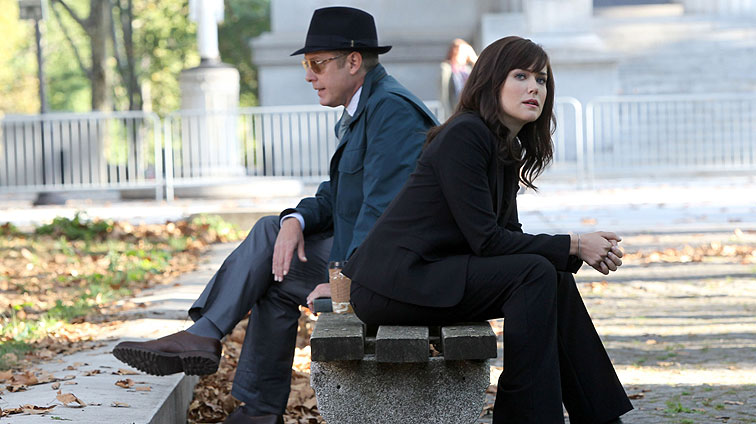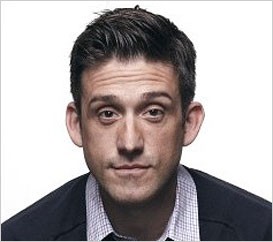
Red’s Black Heart
The Blacklist’s Jon Bokenkamp describes the largest difference between writing features and TV and what makes a murderous psychopath such as James Spader’s “Red” Reddington so likeable.
 Jon Bokenkamp
Jon Bokenkamp
The first time I ever pitched a TV show, I went in and talked to my agent at the time about the show. I said, ‘It's going to be so great because in the end it's going to be…’ He said, ‘Okay. First, don't ever pitch an ending on TV.’
A little while back on NBC’s hit thriller The Blacklist, someone wronged criminal mastermind Raymond Reddington—and he didn’t take it very well.
You or I might have worked through a similar issue with a glass of wine, some kvetching, and a passive aggressive tweet or two. But not Reddington, played to the hilt by America’s favorite quirky character actor James Spader. Instead, the aptly nicknamed “Red” went on a killing spree, systematically mowing down everyone involved in the double-cross.
Does that qualify Red as a bona fide psychopath? According to his creator, film scribe-cum-showrunner Jon Bokenkamp, that’s a resounding “Yes!”
Sort of.
“People make comparisons to Silence of the Lambs,” explains Bokenkamp, whose CV includes Taking Lives, Perfect Stranger, and The Call, “but Hannibal [Lecter] is a total psychopath. He's eating people, and he's just bad. The audience has an understanding that Red is more than just bad, that maybe he's not all that he seems. We want to believe that there's something relatable in all that he's doing.”
In other words, he’s a psychopath, but if ratings are any indication, he’s a loveable psychopath. “Yes, he's bad,” justifies Bokenkamp, “but the people he's taking out are badder than he is.”
What's the difference between writing a good thriller film script and spreading that tension across an entire television season?
They’re very different worlds, features and TV. In terms of the storytelling, it's both intimidating and exciting to have an open-ended story with a television show. That's really the largest difference to me. In the movies that I've written, I've always felt like they're a math problem. If I know the end, I can work backwards and piece it together, arriving at some sort of nice reveal or surprise ending that's hopefully emotionally satisfying. But with these stories, we're spinning a lot of plates, so we're trying to not only answer a case of the week and satisfy the mystery there, but we’re also answering some of the longer arcing serialized questions without going too far. So to me it's that balancing act.
The first time I ever pitched a TV show, I went in and talked to my agent at the time about the show. I said, “It's going to be so great because in the end it's going to be…” and told him what was going to happen. He said, "Okay. First, don't ever pitch an ending on TV.”
I thought, “Oh my God, I don't even know how to do that!” That, to me, is the most striking sort of difference.
Obviously there are at least two characters on this show who have big secrets. Are you working back from the reveals of those secrets, or are you winging it?
It's a little bit of both. I'd be lying if I said it was all figured out because it's certainly not. There's a lot that you find as you go along. But there are definitely key characters that I have a really firm understanding of. I know where they're going and who they are and how they fit into the larger mythology. But we've had instances where we introduce a character, and we're not quite sure where it will go and that really opens the stories up to us. There’s a road map, but it’s a constantly shifting sort of map.
So you have a few truths to the reality of the show but surrounding those truths there are a number of other ones that shift as everything evolves. Is that how it works?
Yeah, that's right. We definitely have signposts that we know we want to hit, we know where we want to end up by the end of the season, wherever we want to end up. We know some big moments, but how we get there is the fun part.
Are there big secrets that you plan to draw out four, five, six seasons?
Yes.
The suspense becomes a Moonlighting thing. Once they kiss it's over.
I know! That's one of the hardest things that we're constantly struggling with: How much is too much, how much is too far? What we don't want to do is just tease people along, not give answers, and constantly raise questions—but I do feel like we've been successful in that the answers we give are firm and solid, but they also raise another question or potentially two.
The instinct is to start burning through the mythology and when something's not working, go right into that serialized story and tell more about the characters and their backstories. But it's a temptation we have to resist because we don't want to go through it too quickly. So it's something that we're finding our way on, and I hope we're not moving too quickly, and yet I hope we can keep audiences engaged.
Let's talk about James Spader. He is such a massive personality, and people expect him to act in a certain way. Was he in the show to begin with and does his eccentric personality play a part in your creative process?
I wasn't really thinking of anyone in particular when I was writing the pilot. We almost pushed the pilot because we didn't have the star or an actor to play Red, and he sort of came on at the last moment. Once we started talking about the character, he was very insightful, and he really got what the material. Now what's weird for me is I really have a hard time not hearing his voice or his cadence or seeing him in that role. He really brought it to life.
I don't know what I had in my head. I guess versions of things like Keyser Söze from Usual Suspects or John Doe from Se7en, general movie trope mythic bad guys. But now, his sense of humor and his directness and some of the confidence and the vulnerabilities that he brings to it are part of the character and I don't think that can be extracted.
And did you have to rewrite the pilot once he jumped on?
No. James had ideas that made it a little more in his voice, but the plot didn't change at all, the character really didn't change at all. He just deepened things that were there. He has a very strange sense of humor—which I find quite hilarious—so he claims that he saw the humor in the role as originally scripted. I didn't see it quite as funny. If I have a fault it's being too serious. He has really encouraged me in the room to embrace the absurdity of it all and to let Red relish the fact that he is Raymond Reddington.
He loves being Raymond Reddington, so the delight and joy he takes in that has become part of the character. He's somebody who's fascinated by life and experiences.
Red is a very likeable anti-hero, but when you really deconstruct him, he does awful, awful things.
Oh, he's a horrible guy. He's the worst guy on TV.
So why do we still like him?
That sense of humor is a big part of what makes him likeable. There's a joy that we get to take as an audience in the things that he does, sort of a wish fulfillment. He does things and says things that we might want to do or say but don't. On a certain level that's important to the character; he recognizes how absurd all of it is. He’s just self-aware enough that he's not taking himself too seriously.
Do you mean the character or the actor?
The character. When I reference Usual Suspects or Se7en, those are incredibly grounded, dark villains, and there's not a lot of humor in them. That's, hopefully, what allows Reddington to be a little more likeable. Also there's something within the character that is tragic and is somehow relatable. That part of us, at least for me, is rooting for him because I know something bad happened to him.
The story that we've been told is not the whole story. He says up front in the pilot, "Everything about me is a lie." Maybe we want there to be an element of redemption, that he might not need to be just a psychopath.
In the pre-DVR/DVD/Hulu/Netflix days, it was easier to take liberties with plot logic since people couldn’t watch an entire season in one weekend and pick up on the errors. With the advent of binge watching, are you more mindful of the storyline?
We're super-mindful of making sure that the logic and the mythology and the stories track. In terms of how people watch the show, we're not really mindful of that because it's just happening so fast in the room. I’m rewriting on Wednesday when we're shooting scenes on Thursday that are going to air on Monday. The pace is so overwhelming, especially coming from features where I took three years to write my first script. Now, we're writing something today that's on in three days. It's very present and in front of us. It's just happening so fast that I don't feel like we have a chance to take a breath and step back, so we're just doing our best to make sure that logic all tracks… I'm giving you a terrible answer.
No, no, no, that's a great answer.
The short answer is no.
© 2014 Writers Guild of America West
